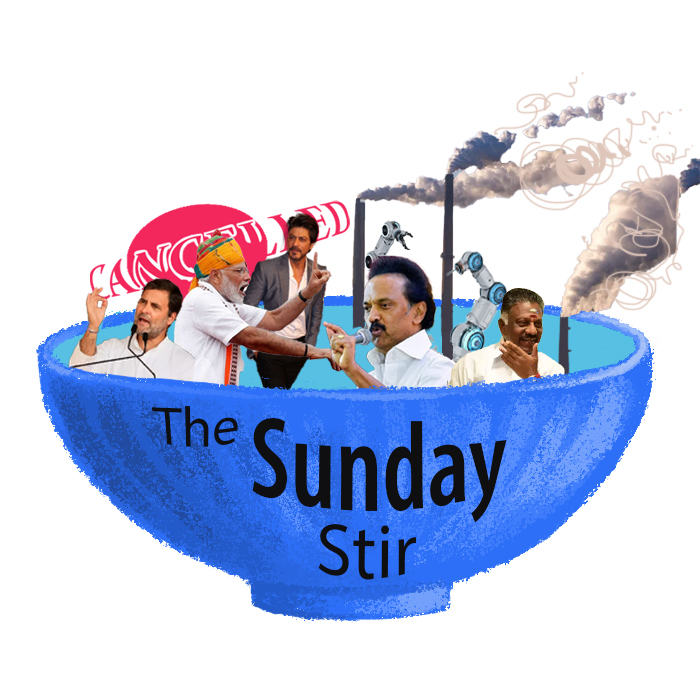As Hindus across the world celebrate Deepavali a.k.a Diwali this weekend with sweets and crackers to commemorate the triumph of good over evil, we Indians have good reason to celebrate a little more this year — the Supreme Court of India has, after quite a while, come to the rescue of our democratic values by slamming the Punjab Governor.
On Friday, a SC bench comprising Chief Justice of India DY Chandrachud, Justices JB Pardiwala and Manoj Misra have asked those questions that have been rattling the minds of several million concerned citizens over the past decade or so. In a case pertaining to the Punjab Governor delaying assent to several bills passed by the Mann Singh government casting doubts on the legality of the assembly session in which the bills were passed, the SC Bench has warned that the Governor was ‘playing with fire’ and choking our democracy.
The bench observed that ‘in a Parliamentary form of democracy, real power rests with the elected representatives of the people’ and that the ‘Governor, as an appointee of the President, is the titular head of the state.”
“In a Parliamentary form of democracy, real power rests with the elected representatives of the people.”
The SC also noted that “any attempt to cast doubt on the session of the legislature would be fraught with great perils to democracy. The Speaker, who has been recognised to be the guardian of the privileges of house, was acting in his jurisdiction in adjourning the house sine die. Casting doubt on the validity of the session of the house is not a constitutional option open to the governor.”
Along with the Punjab government, TN has also approached the SC with a similar grievance claiming that at least 12 Bills passed by the state assembly have been waiting for the Governor’s assent, some of them for over three years. Appearing on behalf of the state government, senior advocate Abhishek Manu Singhvi, highlighted that that more than 54 files relating to remission of prisoners were pending with the TN Governor as on date.
The petition stated that the governor was not signing remission orders, day to day files, appointment orders, approving recruitment orders, granting approval to prosecute Ministers or MLAs involved in corruption, and Bills passed by the Tamil Nadu legislative assembly.
In its plea filed under Article 32 of the Constitution, the Tamil Nadu government has claimed that the governor has positioned himself as a “political rival” to the legitimately elected state government. The petition stated that the governor was not signing remission orders, day to day files, appointment orders, approving recruitment orders, granting approval to prosecute Ministers or MLAs involved in corruption, and Bills passed by the Tamil Nadu legislative assembly. The state government has also sought directions from the Supreme Court to stipulate the outer time limit for the governor to consider Bills passed by the Legislature sent for his assent under Article 200 of the Constitution. It further sought directions for disposal of all the Bills, files and government orders which are pending with the governor’s office within a specified timeframe.
The role of the Governor in handling bills passed by the state legislative assembly is present in theArticle 200 of the Indian Constitution under the ‘Assent to Bills’ section, which is as follows: ‘When a Bill has been passed by the Legislative Assembly of a State or, in the case of a State having a Legislative Council, has been passed by both Houses of the Legislature of the State, it shall be presented to the Governor and the Governor shall declare either that he assents to the Bill or that he withholds assent therefrom or that he reserves the Bill for the consideration of the President: Provided that the Governor may, as soon as possible after the presentation to him of the Bill for assent, return the Bill if it is not a Money Bill together with a message requesting that the House or Houses will reconsider the Bill or any specified provisions thereof and, in particular, will consider the desirability of introducing any such amendments as he may recommend in his message and, when a Bill is so returned, the House or Houses shall reconsider the Bill accordingly, and if the Bill is passed again by the House or Houses with or without amendment and presented to the Governor for assent, the Governor shall not withhold assent therefrom: Provided further that the Governor shall not assent to, but shall reserve for the consideration of the President, any Bill which in the opinion of the Governor would, if it became law, so derogate from the powers of the High Court as to endanger the position which that Court is by this Constitution designed to fill.’
Further, in April 2023, with respect to a Writ Petition filed by the Telangana state government against the Governor of the State, the SC court had reiterated that Governors must return bills as soon as possible and that the first proviso to Article 200 which states that the Governor may “as soon as possible after the presentation” of the Bill for assent, return the Bill if it is not a Money Bill together with a message for reconsideration to the House or Houses of the State Legislature. The Court observed that expression “as soon as possible” had significant constitutional content and must be borne in mind by constitutional authorities.
Incidentally, the Punjab Governor Banwarilal Purohit who has been pulled up by the top court, was the TN Governor until he was shifted to the northern state.
Despite the constitution being as clear on this, the call for a celebration merely indicates how these democratic principles have been derailed by Governors over the years in all states ruled by Opposition parties, particularly in TN where successive Governors have made it their mission to obstruct activities of the state government. Incidentally, the Punjab Governor Banwarilal Purohit who has been pulled up by the top court, was the TN Governor until he was shifted to the northern state.
In this backdrop, the SC issuing a stern warning to the Punjab Governor not to disregard a democratically elected government gives us hope that the long pendency of bills passed by TN legislators to fulfill promises made to their voters are not at the mercy of Governors appointed by the President. And, that for sure calls for a celebration.


